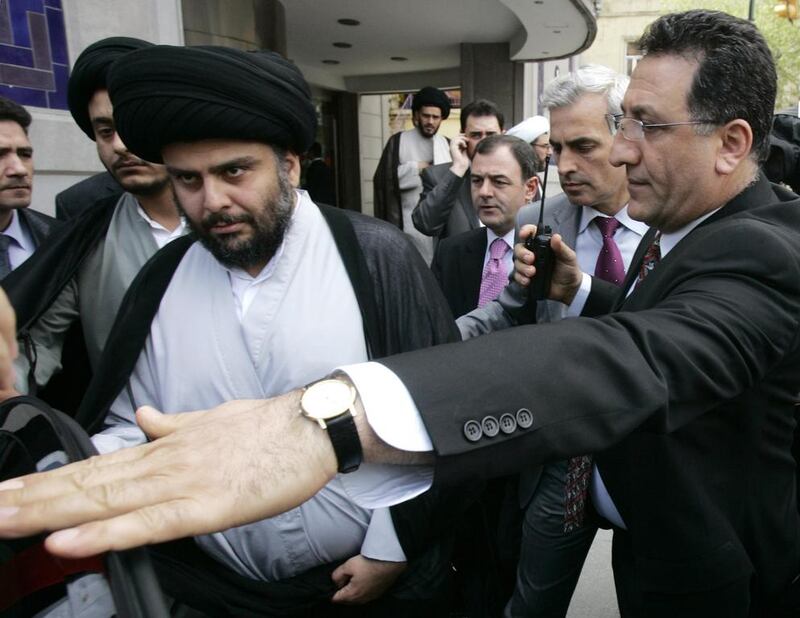As Iraq descends into sectarian chaos and political leaders struggle to form a new government, the country faces a new danger: conflict among competing intra-Shiite factions.
While most attention has been focused on the struggle between Grand Ayatollah Ali Al Sistani and Nouri Al Maliki, the outgoing prime minister, there is another important player: Muqtada Al Sadr. He is waiting for his opportunity to play the saviour of Iraq’s Shiites.
Once a renegade cleric with a ragtag militia fighting US forces, Mr Al Sadr has transformed himself into a statesman. He controlled a major bloc in the Iraqi parliament and he became a kingmaker in the selection of Iraq’s prime minister in 2010.
Today, Iraq is facing its gravest threat since 2003. The Islamic State group has declared a caliphate that stretches across Syria and Iraq.
After the Islamic State’s takeover of Mosul, Mr Al Sistani, the most revered cleric in Iraq, emerged from seclusion in an effort to restrain the jihadists, persuade the Shiite political elite to replace Mr Al Maliki and preserve a unified state under a Shiite-led government. Mr Al Sistani issued a call to arms in June, urging all able-bodied Iraqi men to join the security forces. Within a week, thousands of Shiite volunteers joined the Iraqi military or one of a growing number of Shiite militias – two forces that are difficult to distinguish in the current crisis.
Mr Al Sadr does not have the religious credentials of Mr Al Sistani or other senior clerics, but he is the son of a revered ayatollah and he has broad support among the masses. In the days after the takeover of Mosul, Mr Al Sadr called for establishing “peace brigades” that would protect Shiite holy sites in Iraq.
By mid-June, it became clear that Mr Al Sadr’s “peace brigades” were simply a new label for his Mahdi Army. This paramilitary force led a Shiite rebellion against US troops in 2004, and it carried out a bloody campaign against Sunnis during the subsequent civil war.
In 2008, the Mahdi Army supposedly disbanded. But on June 21, in Baghdad’s Sadr City, where the cleric has his base of support, and in Najaf and Karbala, the militia staged its largest show of force in six years. Thousands of fighters marched through the streets with machine guns, rocket-propelled grenades and explosives belts strapped to their chests. “I will purify Mosul, I am a Sadrist,” some of the fighters chanted, following a drill instructor.
Mr Al Sadr announced that his militia would not operate under the control of the Iraqi military or the government – in direct contradiction of Mr Al Sistani’s appeal for all volunteers and militias to coordinate with the Iraqi security forces.
Mr Al Sadr represents the triumph of a defiant brand of Shiism in Iraq. Because Mr Al Sistani and other senior theologians shun direct political involvement, they create a power vacuum among Iraqi Shiites, one that Mr Al Sadr is eager to fill. He wants to be both a respected cleric and a political broker.
In the Shiite world, it is unusual for a young cleric with Mr Al Sadr’s limited theological credentials to gain such a wide following. He is several ranks and years away from attaining the title of ayatollah. But he is the only surviving son of Grand Ayatollah Mohammad Sadiq Al Sadr, who was assassinated by the Iraqi regime in 1999. The elder Mr Al Sadr was a leading Shiite scholar and advocated a strong political role for the clergy. Mr Al Sistani and the elder Al Sadr became rivals in the religious hierarchy.
Aside from his pedigree, Mr Al Sadr has another claim to leadership: he did not leave Iraq to live in comfortable exile during Saddam’s rule.
Amid the euphoria that followed Saddam’s removal in 2003, clergymen debated their role in politics. Mr Al Sadr and his supporters argued that they must fill the void left by the Baathist system. They denounced the US occupation and Washington’s plan to install an interim government made up of exiled Iraqi politicians.
Mr Al Sadr’s followers seized control of hospitals, schools and mosques in parts of Baghdad, Najaf and Karbala. They provided social services in the absence of a central government. Posters of Mr Al Sadr and his martyred father lined the walls of Shiite neighbourhoods. He drew tens of thousands to his rallies and Friday sermons.
Mr Al Sadr started out as a militia leader, with the populist appeal and credibility that comes from being heir to a family of martyrs. He then turned himself into one of Iraq’s most effective politicians.
The elder clerics watched from the sidelines, confident that their rarefied religious authority would be more enduring than the young upstart’s fleeting political power. Now, he is once again poised to become a kingmaker in Iraq.
Mohamad Bazzi is a journalism professor at New York University and a former Middle East bureau chief for Newsday
On Twitter: @BazziNYU





